Creative Parenting by Penguins
CAPE ROYDS, ROSS ISLAND, ANTARCTICA– The penguins at Cape Royds have been challenged in recent years by widely varying extremes of conditions, mostly having to do with how far they have to walk between colony and ocean. That’s a very big deal for them. With the arrival of the big icebergs to this corner of the Ross Sea in 2001, the Royds penguins have experienced 5 years out of 8 in which their walk has been daunting. During egg laying in those five years they had a walk of 70 km. This was after migrating from their wintering area about 1000 km away.
One result was that the coordination and synchrony of birds with their former maters was thrown out of whack, one bird often arriving much later than the other. It’s not that this sort of condition is new to Adélie penguins, as they are pack ice creatures by choice. In a way, they are ‘used’ to it, sort of (the vagaries of pack ice that is).
When a male penguin arrives and his former mate is late (or doesn’t arrive at all), usually he has some difficulty in finding a new partner. In many cases, he goes the entire spring and summer trying to attract a new one and establish a pair bond. In the case of females, she’ll begin to look for an unattached male after waiting a few days, mateless. The mortality of females is higher, and so there is a surplus of males; easier pickings for females. In the vast majority of pairs, unless they are lost, the laying of eggs and tending of chicks occurs without fanfare: the members of the pair alternate duties equally to raise their chicks.
Well, as a bit of a related aside, in my interview with Werner Herzog for his film “Encounters at the End of the World” a year or two ago (yes, you should see the movie, came out earlier this year), he tried to get me to talk about deviant or maladaptive behavior in penguins. I really didn’t know why he persisted in asking me these questions (later I found out it had to do with a penguin that wandered into their camp at the base of the McMurdo Dry Valleys, sort of lost) and I deflected his questioning pretty well (?).
He wanted me to talk about gay penguins…heck, why not, I’m sure there are some of those. There’s that lovely story about the penguins in the Bronx Zoo, Tango Makes Three, banned by some immoral (or at least unauthorized) persons who were put off by what they viewed to be deviant behavior. And then he asked questions about other sorts of things, like prostitution. The latter happens when a devious female (not deviant) gains access to a male’s nest, by being totally submissive, and then makes off with one of his rocks. A researcher published a short note about this several years ago, and of course this made the front page of the London Times. Right, sells newspapers!
In any case, check out the following histories. The first was last season, when owing to lots of wind, the pack ice was very extensive during the winter and many penguins had a super long trek to make in the spring. Many arrived later than they should. What to do if you’re a female and your mate is nowhere to be found upon arriving at Cape Royds? Well, one female attracted a young, mateless male (Band # 04163) to her nest. They paired, and she laid eggs and then departed, as females are supposed to do. Well, a few days later the female’s mate of the previous year apparently returned, kicked #04163 off the nest, and of course the eggs, in the process. #04163 moped around for a week. The female came back and, of course, associated with her old mate. #04163 moped some more and then left. This past season, he showed up again and attracted a female (the one of the previous season?), who laid eggs, and on they went for quite a while (eventually skuas stole the eggs). Hmmm.
This season, without much wind during winter, the large-scale pack ice was not extensive and so wintering areas were closer than usual. Many birds arrived a week earlier than in the past since they had a much shorter distance to travel. In one case, female #02985 arrived much later than her mate, paired with another male, and quickly laid eggs. That mate, having been around a while, then left first but returned in 7 days, just in time. Off she went, but then this male’s former partner arrived and began tending the nest and eggs. Eventually, #02985 came back, very late owing to that 70 km walk, and found herself without a nest. The two formerly paired birds currently are raising two, somewhat adopted young. #02985 is pacing around, dejected.
A similar scenario happened, this time with another female banded penguin, #03809. She paired, apparently with a new partner, laid eggs and off she went. Same sort of thing happened. She eventually came back, again after a longer than usual trip, to find a stranger on the nest. Well, she somehow managed to sit on the eggs for two days, but then other bird came back and displaced her. So, she’s looking on from a spot above the nest in question.
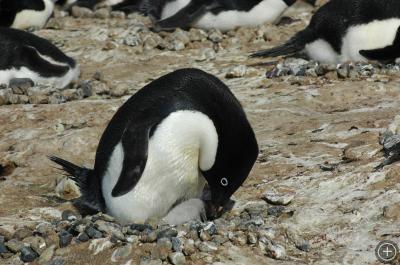
A loving parent, regardless of who was responsible for adding the egg (and ultimately the chick) to the nest.
So, there you have this deviant behavior in penguins. Of course, the really ‘deviant’ behavior (but which I’m sure would not pass as immoral to many people) are the males who come back late to find their ‘homes’ occupied, and then blast the occupants off the property, eggs and/or chicks to boot. You know, protecting one’s home is allowed and is the ‘first’ rule (according to certain national leaders of ours). Then they strut around, collecting rocks to make their castle, friendless and at least for awhile, mateless.
So, you see, penguins are just like people.


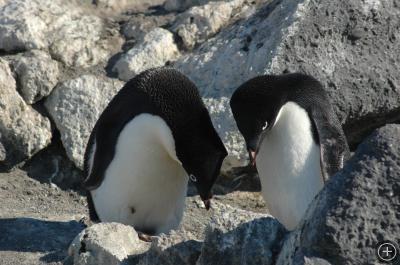
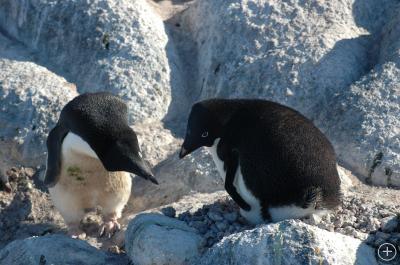
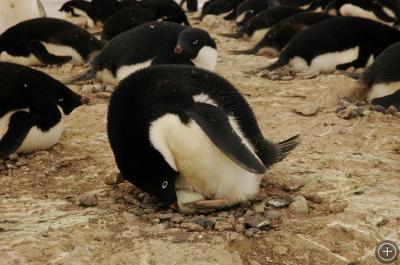

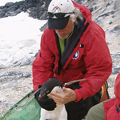

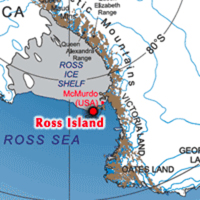





Hi David,
Thanks so much for the great webcast yesterday! It was a wonderful end to our season. Hopefully we weren’t quite as hard on you as Herzog… ;) (whom I thought you did an excellent job of handling, by the way. But whom also left me itching to throw in a gay penguin joke somewhere. ;) )
In all seriousness though, your discussion about climate change in the webcast was quite powerful. (I very much wanted to ask you more questions but we were out of time.) It’s so helpful for people to see and hear about measurable, physical evidence of the effects climate change is already having on our world — it brings a certain immediacy to an issue that some otherwise [mistakenly but understandably] think of as distant and looming, but not yet arrived.
Anyway, thank you again, and wonderful dispatch! (As always.) Best of luck on the rest of your season.
All the best,
Kate